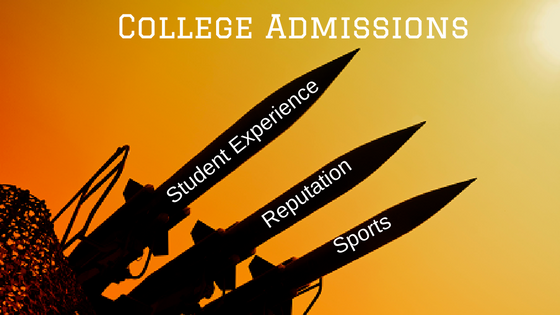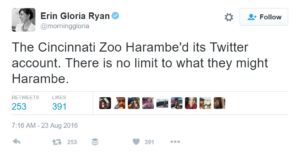The university admissions process is a big topic around my house these days as my daughter is prepping for college entrance exams. Higher education has never been such a big business, and the college decision grows more complicated as rankings proliferate from well-known media outlets and unknown blogs alike. Questions are beginning to swirl around our atmosphere of friends, colleagues and family members. Where can your kid get in? What universities, if any, are affordable? What defines a good college reputation these days? More questions than answers.
One thing I know for sure is that many of the nation’s thousands of colleges and universities are engaged in a reputational arms race.
One of the main battlegrounds is intercollegiate sports, and Forbes and the Center for College Affordability and Productivity recently completed a study about it. (Given my obsessive relationship with college football, it’s no wonder I found this interesting.) If you follow college sports, you have heard about universities bulking-up their sports programs with the goal of raising the school’s overall profile. Nike founder Phil Knight famously donates millions to his beloved University of Oregon with one of the indisputable strategies being that better sports teams (and very flashy uniforms) will increase the overall reputation of the university. Financier T. Boone Pickens has made similar donations to Oklahoma State University, and I’m sure there are many other examples.
Proficiency in sports can certainly make schools better known to applicants. Gonzaga, a private Roman Catholic university in Washington, was largely unknown to those of us east of the Mississippi until its basketball team made the NCAA basketball tournament in 1999. Along with several Sweet 16 appearances, applications to Gonzaga tripled between 1999-2013. Administrators draw a direct correlation between success on the court and admissions.
Forbes and CCAP found a statistically significant positive relationship between membership in Division I-A and academic reputation. From the article:
The relationship was pretty strong. Other things equal, a mid-quality school might rank roughly 350 if it were not in Division I-A, but typically would rank around 300 or a little better if it were in Division I-A. Having pretty bigtime football and basketball is associated with a meaningful improvement in perceived academic reputation.
So, it turns out that Knight and Pickens are on to something. Billionaires are like that.
Yet here’s the wrinkle: How important is reputation in the minds of would-be applicants? I spoke with Lisa Malat at Barnes & Noble College which operates 751 bookstores at colleges and universities throughout the country. A division of Barnes & Noble Education, which is a separate public company from the namesake retailer (where you can buy my book), Barnes & Noble College has a singular focus on the college marketplace, from the moment a student steps on campus and even through their alumni experience. The company has studied many aspects of the student/college experience, including admissions, and found that reputation means more to parents than it does to prospective students. Interesting right?
In one of its studies, Barnes & Noble College found that students are very concerned about the cost of college and are putting a greater weight on saving money than we thought, looking to balance the true value that they will receive from college. Parents, it turns out, are more concerned than their kids about brand reputation. Students are looking hard for a good fit while many parents are stuck in their ways and leaning towards the “names they know” – sounds like reputation to me.
How important is the right fit? Barnes & Noble College thinks it’s crucial and built its business around helping students succeed academically and socially. Obviously, the purveyors of books and supplies want to make sure students have all the right tools, but the company also helps students with their social experience. According to Malat, students often remark that they met their first college friend at a bookstore-sponsored orientation, and she says that the company views itself as part of the college support system, serving as a campus hub in most locations and in particular those where it has a café. All-nighters require coffee and snacks, right? The bookstores also offer de-stress events during exam time, including providing massage chairs and, get this, puppy visits. Clearly not the college bookstore I remember.

All of this points to the value of the “experience” provided by the university and its surrounding community. Yes, we want our kids to attend the school with the best possible academic reputation, but will that necessarily be the best fit for them? The experience and the social and cultural fit appear to outperform reputation in many cases, and particularly in the eyes of the incoming students who will ultimately be making the admission decision – and cracking the books.
Sure, I love my college sports, but I bet my brilliant daughter will pick the puppies. What do you think?
–John
Online Reputation #Fail of the Week: Zoo Can’t Take the Meme Pressure
Back in May, Harambe the silverback gorilla at the Cincinnati Zoo was shot after a boy fell into his enclosure. The incident sparked worldwide outrage, and many still blame the zoo for the death of the gorilla. Ever since, the zoo has been hit with a barrage of negative social media posts, gifs and memes. Some are entertaining, some heartbreaking and others just plain mean. Apparently fed up with unending social media attacks, last week the zoo chose to shut down all of its social media accounts. Bad idea. I’m not sure who suggested this advice to the zoo, but it was a poor decision and the collective internet replied in force – causing further reputational damage to the zoo. The tweet below wins the prize.
Unfortunately, the rules of social media engagement are different during a catastrophe. Sometimes you just have to take your online lumps, even if you feel like the attacks are unfair and make it difficult to heal. As I have said before in my blog and in my book, you don’t get to be off the grid. When the zoo disengaged, it brought on more negative coverage while stepping away from the platform which it should be using to rebuild its tattered reputation.


